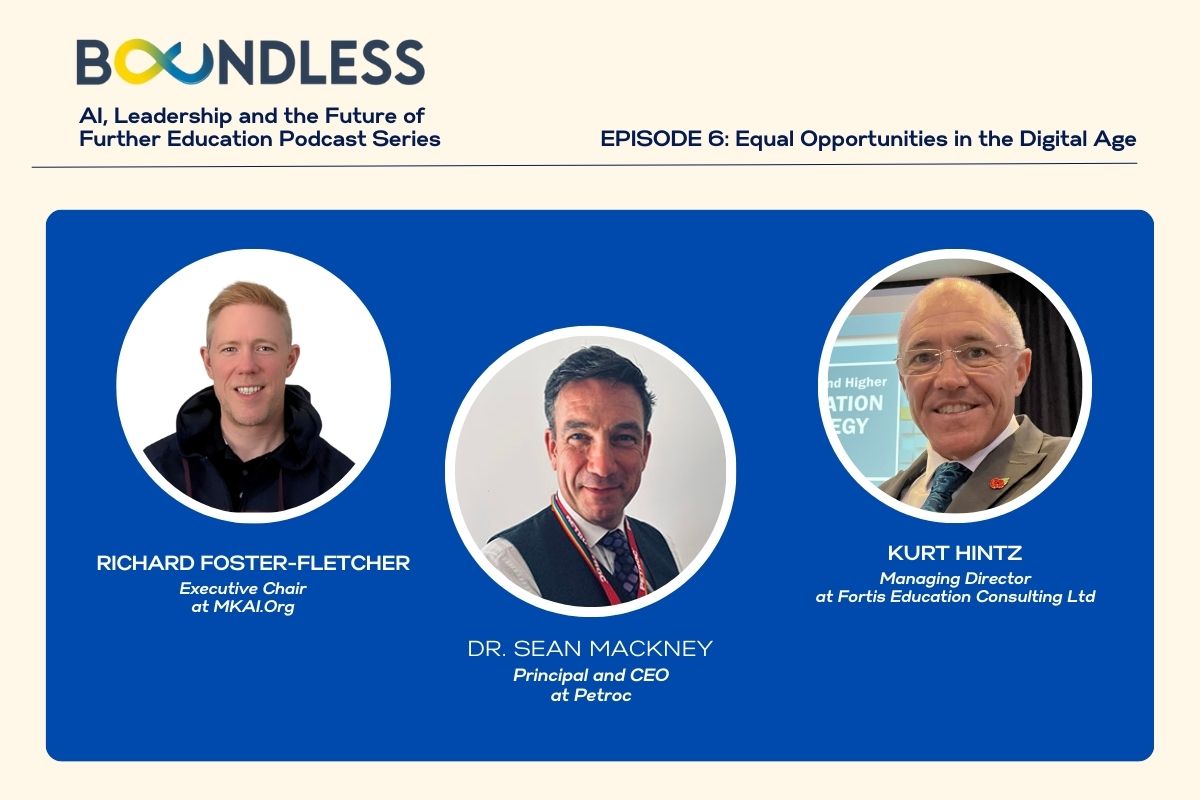Equal Opportunities in the Digital Age : Episode 6: AI, Leadership, and the Future of Further Education

In the latest episode of the podcast series “Artificial Intelligence, Leadership and the Future of Further Education,” hosts Richard Foster-Fletcher, Kurt Hintz, together with guest Dr. Sean Mackney engage in a profound discussion on the pivotal role of artificial intelligence (AI) in reshaping the educational landscape. Here are some takeaways from their insightful dialogue, exploring the vast potential and complexities of integrating AI into further education and leadership.
Democratising Education Through AI
The episode begins with a compelling exploration of how AI can level the educational playing field. Dr. Sean Mackney expresses optimism about AI’s ability to enhance access to quality education, particularly for those from disadvantaged backgrounds. He introduces innovative concepts like ‘group-fetch’, where AI supports more personalised learning experiences and fosters deeper interpersonal relationships within educational contexts. Additionally, Kurt Hintz discusses ‘cognitive offload’, a process where AI handles complex tasks to free up cognitive resources, allowing students to engage more deeply in other learning activities.
Governmental Policies and the Future of Lifelong Learning
A significant focus of the conversation is on the implications of AI for educational policy. Dr. Mackney emphasises the importance of developing policies that keep pace with rapid technological advancements to mitigate potential negative impacts. The discussion underlines the crucial role of government policies in ensuring the successful integration of AI across educational sectors and in promoting lifelong learning initiatives.
Ethical Considerations in AI-Enhanced Education
The ethical dimensions of AI in education form a core part of the panel’s debate. Richard, Kurt and Dr. Mackney tackle issues related to inclusivity, arguing that AI should be employed to create a more inclusive educational environment. They also delve into the ethical use of data, the potential risks and benefits of learning analytics, and how AI can be used to monitor skills and behaviours. These discussions reveal diverse viewpoints on the implications for personal privacy and growth.
The Role of Colleges in an AI-Driven World
The hosts and their guest envision colleges as community hubs in the AI era, playing a vital role in driving productivity and fostering equality. They advocate for strong government frameworks to guide the ethical use of AI and data in educational institutions, ensuring that colleges continue to serve as central figures in community and technological progress.
Preparing for an AI-Focused Future: Skills and Careers
The necessity for adaptability in careers within an AI-driven society is another critical theme. They highlight how traditional roles are evolving—such as bricklayers learning to operate drones—underscoring the importance of continuous learning and adaptability in the workforce.
Actionable Steps for Stakeholders
The episode concludes with practical recommendations for educators and policymakers:
- Implement ethical guidelines for the use of AI in educational settings.
- Advocate for government frameworks that promote the ethical deployment of AI.
- Foster a balanced approach that values both technological progress and ethical considerations.
Conclusion
This episode provides a comprehensive framework for understanding the crucial aspects of AI integration into education. It emphasises the need for thoughtful and well-considered approaches to ensure that AI serves as a powerful tool for enhancing educational equity, rather than becoming a barrier. For educators, policymakers, and thought leaders, this discussion offers valuable insights and directions for future action in the evolving landscape of AI in education.











Responses